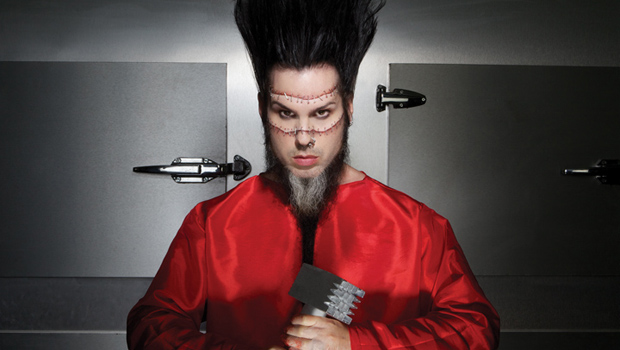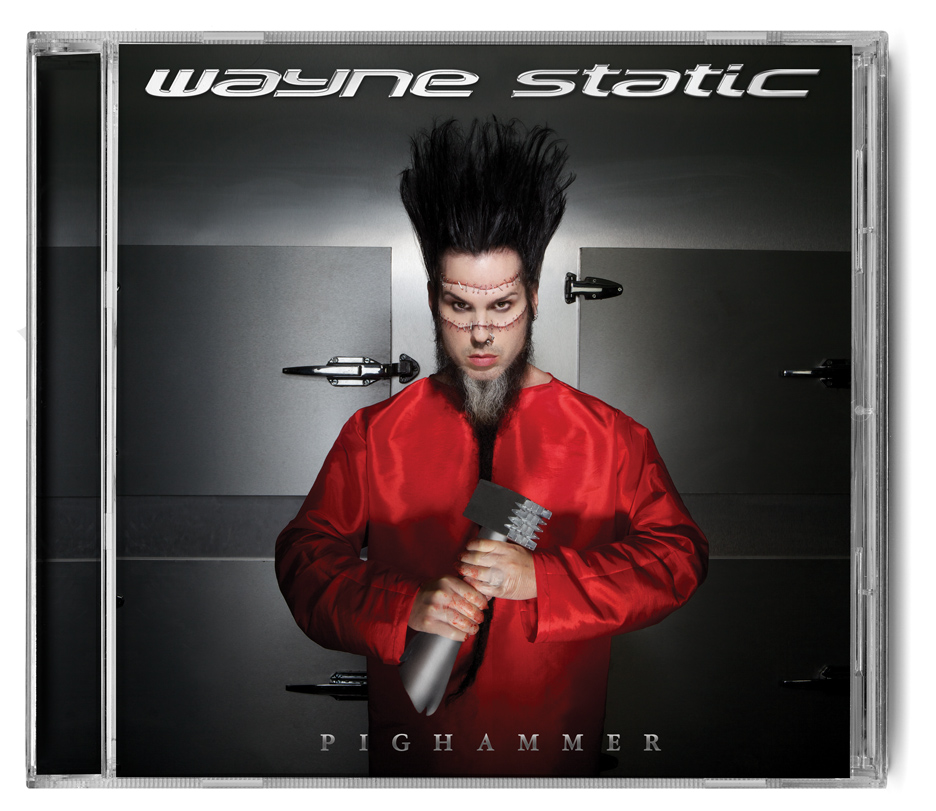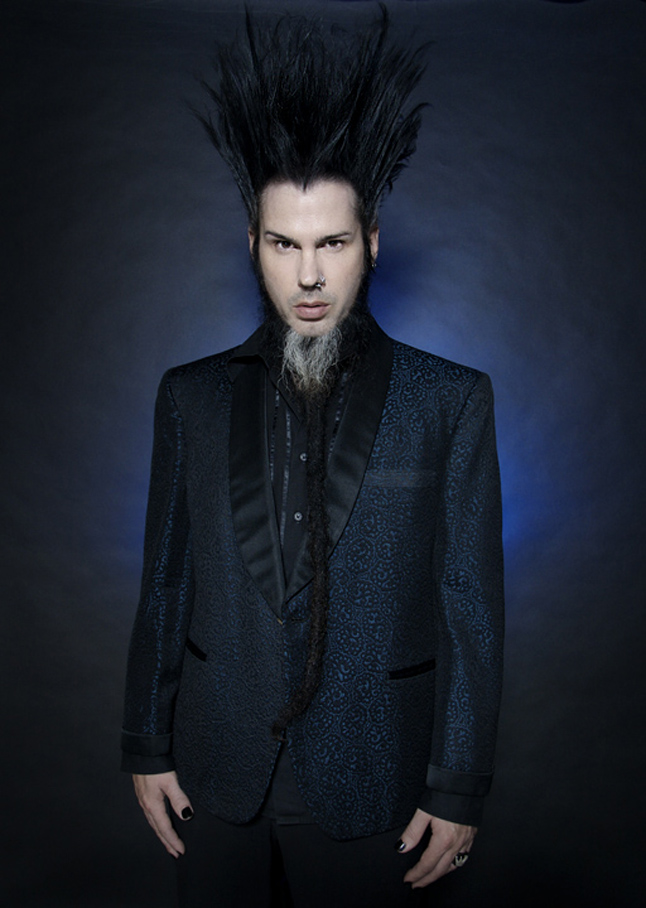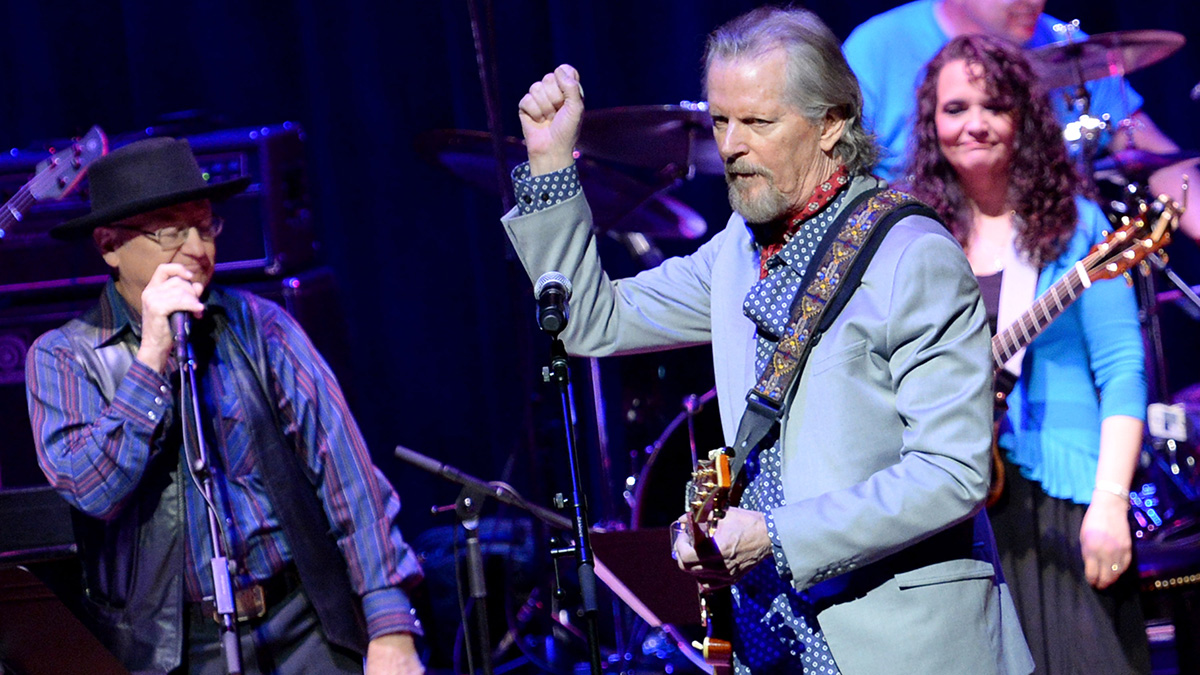Interview: Former Static-X Frontman Wayne Static Discusses His New Album, 'Pighammer'

Wayne Static entertained thoughts of a solo project during his years fronting Static-X, but the multi-platinum band’s recording and touring schedules put the idea on hold.
When the group dissolved after their final tour in 2009, the opportunity presented itself to begin working on the material that became Pighammer.
The album’s theme — represented by a plastic surgeon with a pig fetish who uses a hammer made from a pig foot to turn attractive women into swine — is transformation: Static is now a drug-free solo artist who left Los Angeles to concentrate on his music.
He’s not leaving Static-X behind, as some of their material will make its way into his current tour, which begins Tuesday, September 27, just days prior to the October 4 release of Pighammer.
When and where did you record this album?
About a year and a half ago, we sold our house and moved out to the desert by Joshua Tree. There’s a little studio here called Giant Rock Studio, and we pretty much lived there for an entire year. I wrote and recorded at the same time, so it was a much different process. In the past, I’d write a song, make demos, give the demos to the band, get together with the band, do a month of rehearsals and everyone changed things and added their own parts. Then we’d go to another studio and try to recreate some kind of excitement that I had when I wrote the songs, which I think gets lost by the end of that process.
This time, I was recording while I was writing, so there’s a lot of excitement captured in the recordings. I played everything on the record, and my wife [Tera Wray] did the female vocal bits here and there. I produced and I had an engineer, Jack Keener, helping me out. I’ve known him for a few years, but this was the first time we worked together. It’s good to have somebody there to work the machinery and turn the knobs, because sometimes it’s a lot to do by yourself and you get more caught up in turning knobs than performing.
Get The Pick Newsletter
All the latest guitar news, interviews, lessons, reviews, deals and more, direct to your inbox!
Did you miss interacting and collaborating with a band?
No, not really. I’ve always written by myself. I’ve never been in a situation where the whole band sat in a room and wrote a song. I don’t work that way. I always write by myself, and it was really very comfortable and very rewarding to not have to compromise.
Did any of the songs change gears during the tracking process?
I’m always working on multiple songs at a time. There’s usually a couple of songs on the record that come together relatively fast, a day or two, but most of the songs are a process over many months where I’ll work on a song until I get bored with it, set it aside and move on to something else. Some of the songs I never come back to. After months, if I still come back to it and get excited, then I know it’s good.
What is your preferred method for tracking vocals?
I did it the same way I recorded all my demos for Static-X to present to the band. I start with a drum loop, add some keyboards and guitars and build it up from there. It’s just a natural way of doing things for me. It’s the way I’ve always done it, and the vocal usually comes last. I usually have rhythmic ideas during the whole process, but I generally don’t write lyrics until the very end and then record that.
There is no editing on this. I didn’t record on a computer. I recorded 24 tracks, so everything is what it is. It’s all live performances, obviously punched in here and there, but I didn’t do any editing. I don’t like to do any editing on guitars. I think the more editing you do, it just takes away from the feel of the performance. That’s the way I recorded vocals, even when we did record on Pro Tools. I never really liked the whole computer-editing thing. It just takes all the soul out of it.
Did you double a lot of the parts?
I figured out over the years what works for me. I double all my vocals. It gives it balls. I’ve been doing that for so long that it’s really easy for me to double and have things pretty tight. Guitars, I do main left and right and then double things up on choruses at times.
What did you use for effects? Do you stick to what you know or are you always on a quest for the latest and greatest?
I recorded everything on an Alesis HD24, which is a dedicated hard drive machine. It’s not a computer. It’s actually the same machine that we use for our live backing tracks when we go on tour. For guitars I went all direct this time. I used a Line 6 POD mixed in with a Tech 21 preamp, so there’s two guitar sounds mixed together but no live cabinets. The same thing with bass: I went direct. It’s the first time I’ve ever done that, not had cabinets, and the Line 6 stuff is so great nowadays that you don’t necessarily need cabinets for recording.
What do you use onstage?
The whole last tour Static-X did, we didn’t have any cabinets onstage. We went direct Line 6 for everything, so I had the sound dialed in already, although this time on tour I’m going back to Marshalls because I kind of miss the loud vibe of having the cabinets roaring onstage. I’m the opposite of a gearhead. I like simplicity. I use what works, and the only time I change it is when I have to.
I like to focus on the art and writing and not get distracted by learning how to use new gear. I’m still using the same sampler that I used on Wisconsin Death Trip for putting together my loops. I have the same keyboard that I’ve been using for ten years. I like to use the same thing and not be distracted by learning new crap. I use the Korg Electribe for my keyboard and an Akai MPC-2000 for my sampler. I love that sampler. It actually has a groove to it. If you play the MPC programming into Pro Tools, it does not line up on the grid. It grooves back and forth in front of the beat, behind the beat — it’s kind of crazy; it has its own groove to it.
Has your approach to the guitar, as a songwriter and musician, changed over the years?
I don’t think it’s really changed. I like to think I’ve gotten better at it. I just try to do what’s exciting to me at the time and try to push myself while still staying true to what I know I’m good at.
What are you "good at"?
I’m good at screaming, coming up with great loops and groovy drum loops, and I think I’ve got one of the best right hands for picking the guitar. I’m very influenced by people like James Hetfield, and Tommy Victor from Prong, and that kind of precise picking type of thing. Not a lot of guys can do that. It took me a couple of years when I first started getting into it. Early Pantera and Metallica was the first time I heard that kind of playing. It’s a whole different approach, more rhythmic than melodic.
When did you develop your own style?
Somewhere during the recording of Wisconsin Death Trip. I remember, when we were writing back in those days, I was trying to imitate keyboard parts with the guitar. I thought Static-X was going to be more of a dance-oriented industrial band, and then we went in the studio with our producer, Ulrich Wild, and he helped shape what we were doing. During that whole process Static-X got their own identity, which was mostly my idea, so that would be the time period. From there, after that first album, I think I was my biggest influence. I stopped trying to copy other people and that’s when I knew what I did well.
You’ve been off the road for a while. Have you done much practicing?
I don’t practice.
Well, there goes that. Note to readers: Does not practice.
[laughs] I never do, ever. I go months without playing guitar sometimes. To me, practicing is boring and it takes the spontaneity out of what you’re doing. I’ve been playing guitar for almost 40 years; I don’t need to practice anymore, I don’t think. I started playing guitar when I was 7 and I’ll be 46 this year, so basically I just practice with the band to get our chops up before we go on tour, or before I start recording, but other than that, if I’m not writing or recording, I don’t see a need to practice. I do other stuff for fun. It takes a few days to get back into it and that’s all, really. I hate practicing. It’s boring sitting around by yourself playing for hours. I’d rather be out driving my truck through the dirt.
— Alison Richter
Alison Richter interviews artists, producers, engineers and other music industry professionals for print and online publications. Read more of her interviews right here.


Alison Richter is a seasoned journalist who interviews musicians, producers, engineers, and other industry professionals, and covers mental health issues for GuitarWorld.com. Writing credits include a wide range of publications, including GuitarWorld.com, MusicRadar.com, Bass Player, TNAG Connoisseur, Reverb, Music Industry News, Acoustic, Drummer, Guitar.com, Gearphoria, She Shreds, Guitar Girl, and Collectible Guitar.
“I’ve never bought a guitar and I’m quite proud of that! I always tell people when they’re learning: there’s a guitar not being played”: Meet Sacred Paws’ Ray Aggs, the dextrous Tele-wrangler inventing new chords and capturing Thurston Moore’s imagination
“Even standing with the guitars is tricky”: Ritchie Blackmore's health sparks concern after update from wife and musical partner Candice Night




![[from left] George Harrison with his Gretsch Country Gentleman, Norman Harris of Norman's Rare Guitars holds a gold-top Les Paul, John Fogerty with his legendary 1969 Rickenbacker](https://cdn.mos.cms.futurecdn.net/TuH3nuhn9etqjdn5sy4ntW.jpg)





